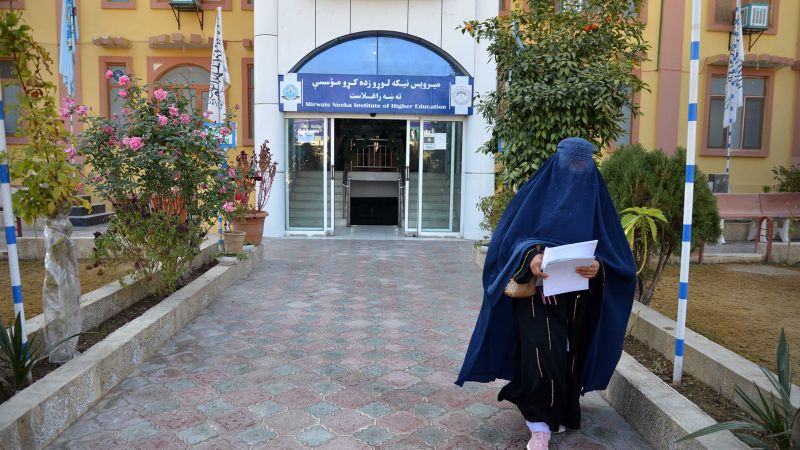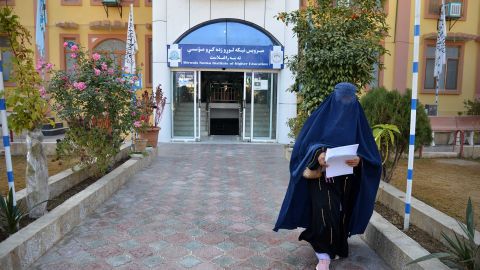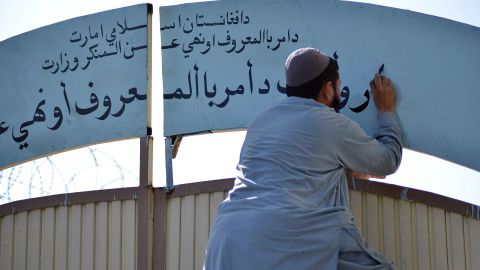
CNN
—
When the Taliban returned to power in Afghanistan in August 2021 in a lightning takeover following the withdrawal of US troops, the radical Islamist group appeared keen to distance itself from its earlier period of rule in the 1990s, presenting itself as more moderate and committed to the internal peace process.
Among its new commitments, the Taliban pledged to honor women’s rights within the norms of “Islamic law.”
The group’s spokesman Suhail Shaheen said at the time that women would be allowed to continue their education up to university – a break from the strict restrictions under the Taliban regime that ruled between 1996 and 2001.
The promises of a softer approach were met with skepticism, both within the country and abroad. Over a million Afghans have reportedly fled since the Taliban retook power.
Sixteen months on, the Taliban appear to have reneged on their word. Women and girls are facing blanket bans on education after a series of decrees steadily eroded their rights in almost all aspects of life and upended the gains they had fought tirelessly for over the past two decades.
Just days after retaking power, the Taliban reinstated the Ministry for the Propagation of Virtue and the Prevention of Vice as a public morality watchdog tasked with enforcing the Taliban’s version of Islamic law. The ministry has since been central to the systematic chipping away of women’s rights in the country.
Here are some of the ways women’s rights have been eroded:
The Taliban announced on September 12, 2021, that women could attend universities with gender-segregated classrooms while wearing compulsory hijabs. But in March 2022, the government barred girls from attending secondary school. Girls’ secondary schools were set to resume on March 23, 2021, after months-long closures imposed after the Taliban takeover. The group ordered them shut just hours after they were due to reopen. The move devastated many students and their families, who described to CNN their dashed dreams of becoming doctors, teachers or engineers.
In its latest step in the clampdown on women’s education, the Taliban on Tuesday suspended university education for all female students. A letter published by the education ministry said the decision was made in a cabinet meeting and the order would go into effect immediately.

Women’s access to public spaces has been significantly curtailed under the Taliban.
On November 10, women were banned from entering all parks in Kabul. Women had previously been allowed to visit parks three days a week, and men on the remaining four. The new rules mean that women are no longer allowed to do so, even if accompanied by male relatives.
The same day, a Taliban official in Kabul announced that women would be barred from using gyms across the country. A spokesperson from the ministry of virtue said the ban was being introduced due to people ignoring segregation orders and women not wearing the hijab.
Women in Afghanistan can no longer work in most sectors. The Taliban ordered working women to stay at home after their seizure of power in August 2021, saying they were not safe in the presence of the group’s soldiers.
Women’s right to travel within Afghanistan and abroad has also been restricted.
Late last year, it was announced that women would require a male escort to travel long distances within the country. Any woman traveling further than 75 kilometers (46 miles) was required to be accompanied by a male chaperone. Mohammad Sadiq Hakif Mahajer, spokesman for the virtue ministry, told CNN at the time that the new law was meant to prevent women from coming to any harm or “disturbance.”
The new rules also called on drivers not to allow women who weren’t wearing the hijab into their cars.
And in March, Afghanistan’s airlines were ordered to stop women from boarding flights unless accompanied by a male chaperone, Reuters reported.
This summer, Taliban supreme leader Hibatullah Akhundzada ordered women to fully cover themselves, including their faces, in public. The decree suggested that women should stay at home where possible, as this was the “best option to observe the sharia hijab.”
Prior to the order, hijabs were only mandatory for women studying at university and girls studying at secondary school. This was mandated in the immediate aftermath of the Taliban’s return to power, when the new government said female students, lecturers and women in employment must wear hijabs in accordance with the group’s interpretation of sharia law.
Taliban authorities have also ordered female television journalists to cover their faces while presenting.

Since sweeping back to power, the Taliban has abolished the Ministry of Women’s Affairs, a key body to promote women’s rights through law. In its place, the new regime set up the notorious Ministry for the Propagation of Virtue and the Prevention of Vice, which has become instrumental in curtailing the rights of women.
It has also rolled back the Elimination of Violence against Women Law, signed in 2009 to protect women from abuses – including forced marriage, leaving them without recourse to justice, according to the UN.
Over the past year, the Taliban’s restrictions on women have increased international concern and are likely to further isolate the country on the world stage.
Commenting after the decision to ban women from university, US State Department spokesperson Ned Price said the move will “further alienate the Taliban from the international community and deny them the legitimacy they desire.”
US Ambassador Robert Wood, the alternate representative for special political affairs, echoed this sentiment, telling a United Nations Security Council briefing that the “Taliban cannot expect to be a legitimate member of the international community until they respect the rights of all Afghans, especially the human rights and fundamental freedoms of women and girls.”
The restrictive new measures could stir further unrest within the country. In the wake of the ban on university education, women on Thursday took to the streets of Kabul to protest the decision. The Taliban arrested five women taking part in the protest, according to the BBC.
